If you’re raising children without the poetry of A.A. Milne—then don’t. Ha!
There are few things that I’d dare give parenting advice about given my own well-proven fallibility and the fact that my kids are a) still small, and b) not that numerous. But I will foist A.A. Milne on anyone who will listen. Here I go: Go get the complete collection of Winnie-the-Pooh, and make sure you get it in four volumes (the big single volume one is too unwieldy). Then get reading.
A.A. Milne is, justly, most famous for the incomparable Winnie-the-Pooh stories, collected in two volumes: Winnie-the-Pooh and The House at Pooh Corner. Pooh is a masterpiece, one of the all-time great works of children’s literature, and I would highly, highly recommend these books. But today, we’re going to spend some time on A.A. Milne’s perfect poetry, which make up the other two volumes of the four-volume Winnie-the-Pooh collection: When We Were Very Young and Now We Are Six.
My brother-in-law (hi, Henry!) recently sent this meme to our family group chat:
Lol. This is why we should all read Milne: He has a genius for capturing childhood, he does a flawless job drawing small psychological dramas, and, perhaps most importantly, his poems always, always scan.
Now, if you’re like me, you’ll be tempted to skip over all the poems in this article and get to the prose—skip the quotes, get to the analysis. But I would beg you to read it all, every last word, especially Milne’s. I would prefer, actually, that you mutter the poems to yourself—or shout them out loud.
Let’s begin with happiness:
Happiness
by A.A. Milne, from When We Were Very YoungJohn had
Great Big
Waterproof
Boots on;
John had a
Great Big
Waterproof
Hat;
John had a
Great Big
Waterproof
Mackintosh—
And that
(Said John)
Is
That.
Here is how we read this poem in our family:
presto forte
JOHN had great big waterproof boots on JOHN had a great big waterproof hat! JOHN had a great big waterproof macintosh and THAT said John, is THAT! (thump thump)
The title of the poem—“Happiness”—is both described and delivered by the mere twenty-seven words that follow. A boy with his rain gear on, ready for anything, is rarely unhappy (especially if it’s new rain gear, which I think the repetition of “great big” does suggest). And a person, any person, reciting “Happiness” with gusto can hardly be sad.
Titles are one of Milne’s great talents. I love a title that illuminates the thesis of the poem, or provides an essential key that the poem itself need not provide. (Other examples include “In a Station of the Metro” by Ezra Pound,1 and “Small Moth” by Sarah Lindsay.2) Another impeccably titled Milne poem, “Forgiven,” is one of my very favorites:
Forgiven
by A.A. Milne, from Now We Are SixI found a little beetle; so that Beetle was his name,
And I called him Alexander and he answered just the same.
I put him in a match-box, and I kept him all the day . . .
And Nanny let my beetle out—
Yes, Nanny let my beetle out—
She went and let my beetle out—
And Beetle ran away.
She said she didn’t mean it, and I never said she did,
She said she wanted matches and she just took off the lid,
She said that she was sorry, but it’s difficult to catch
An excited sort of beetle you've mistaken for a match.
She said that she was sorry, and I really mustn’t mind,
As there’s lots and lots of beetles which she’s certain we could find,
If we looked about the garden for the holes where beetles hid—
And we’d get another match-box and write BEETLE on the lid.
We went to all the places which a beetle might be near,
And we made the sort of noises which a beetle likes to hear,
And I saw a kind of something, and I gave a sort of shout:
“A beetle-house and Alexander Beetle coming out!”
It was Alexander Beetle I'm as certain as can be,
And he had a sort of look as if he thought it must be Me,
And he had a sort of look as if he thought he ought to say:
“I'm very very sorry that I tried to run away.”
And Nanny’s very sorry too for you-know-what-she-did,
And she’s writing ALEXANDER very blackly on the lid,
So Nan and Me are friends, because it’s difficult to catch
An excited Alexander you’ve mistaken for a match.
The interpersonal drama between Nanny and the narrator could not be more precise. The subtle social dynamic unfolding here is as good as anything in Austen or Ishiguro—the poem shows without telling, each line drawing the conflict in sharper detail. One of my favorites is this: “She said she didn’t mean it, and I never said she did,” eclipsed only by this one later in the poem: “Nanny’s very sorry too for you-know-what-she-did.” An indignant, offended boy who insists he isn’t. An apparently repentant Nanny (who probably feels bad only insofar as she now has a problem to fix). A lost beetle who definitely, without a doubt, is found again—definitely the very same one, definitely not a different one. It’s a perfect poem.
Milne has a genius for childhood. I am collecting a list of people that I think have this gift—the gift of apparently understanding, still, as an adult, how a child interacts with the world, combined with the ability to capture that experience in words.3 The latter thing is perhaps most impressive to me, because while children themselves necessarily experience the world as children, they are developmentally unable to put their experience into (sophisticated) language. No child could write “Forgiven”; and no adult but Milne could, either.
Here’s another poem in which Milne captures a perfect childhood moment of play:
Down by the Pond
by A.A. Milne, from Now We Are SixI’m fishing.
Don’t talk, anybody, don’t come near!
Can’t you see that the fish might hear?
He thinks I’m playing with a piece of string;
He thinks I’m another sort of funny sort of thing,
But he doesn’t know I’m fishing—
He doesn’t know I’m fishing.
That’s what I'm doing—
Fishing.
No, I’m not, I’m newting.
Don’t cough, anybody, don’t come by!
Any small noise makes a newt feel shy.
He thinks I’m a bush, or a new sort of tree;
He thinks it’s somebody, but doesn’t think it’s Me.
And he doesn’t know I’m newting—
No, he doesn’t know I’m newting.
That’s what I’m doing—
Newting.
This poem contains another of my all-time favorite lines: “Can’t you see that the fish might hear?” This is the kind of thing that only a child would think to say; a child caught in his game, changing it half-way through, repeating it in the new iteration. A child muttering about what he’s doing and what the fish are doing—“he thinks I’m another sort of funny sort of thing.” A child in his own world, watched (but unaware of it) by his father. A few years ago, I took my kids to a small creek to play, and caught my then-two-year old son muttering under his breath: “No I’m not, I’m newting!” These poems both describe and facilitate childhood.
Milne’s last great talent is his ability to capture not only the glory of childhood, not only to record interpersonal dramas with untouchable precision, but to capture the aching, bittersweet experience of parenting small children. You can see this from the very titles of his two poetry collections: When We Were Very Young and Now We Are Six. The “we” suggests a shared ownership of these young ages; not only is the child very young, but the parent is too. Not only does the child turn six, the age of parenthood does too. Time moves for both persons, but only the parent really knows, with an ever deepening urgency, what that might mean. I have a lump in my throat just thinking about it.
My very favorite poem from these two collections, that captures the beauty and the wonder and the ache of shepherding small lives, is “Sand-Between-the-Toes.” Many of Milne’s poems we read at a near shout, thumping our feet, bumping a child up and down on a knee; this one, though it shares the thumping rhythm of the others, deserves a bit of a hush, a nod to the way a voice carries (or doesn’t) against the howling wind of the sea shore:
Sand-Between-the-Toes
by A.A. Milne, from When We Were Very YoungI went down to the shouting sea,
Taking Christopher down with me,
For Nurse had given us sixpence each—
And down we went to the beach.
We had sand in the eyes and the ears and the nose,
And sand in the hair, and sand-between-the-toes.
Whenever a good nor'wester blows,
Christopher is certain of
Sand-between-the-toes.
The sea was galloping grey and white;
Christopher clutched his sixpence tight;
We clambered over the humping sand—
And Christopher held my hand.
We had sand in the eyes and the ears and the nose,
And sand in the hair, and sand-between-the-toes.
Whenever a good nor'wester blows,
Christopher is certain of
Sand-between-the-toes.
There was a roaring in the sky;
The sea-gulls cried as they blew by;
We tried to talk, but had to shout—
Nobody else was out.
When we got home, we had sand in the hair,
In the eyes and the ears and everywhere;
Whenever a good nor'wester blows,
Christopher is found with
Sand-between-the-toes.
This is the childhood I want for my kiddos. I want them out in the world. I want them “down to the shouting sea,” I want them with sand-between-the-toes, I want them clambering over the humping sand—and I want them to hold my hand. That line—“And Christopher held my hand”—sits at the very center of this poem, as if the day spirals around this moment of connection. And then it spirals out again.
This poem glories in the mess of the world, the mess that our children pull us back into. After a day like this, it’s not just the children, it’s we: “When we got home, we had sand in the hair, / In the eyes and the ears and everywhere.” And yet, in the end, it is Christopher again: “Whenever a good nor-wester blows, / Christopher is found with / Sand-between-the-toes.” Our children are not us. Their experience of the world will be there own. How lucky we are to join them on their adventure.
I want to end with the final stanza of the poem “Forgotten,” which is about the nursery toys wondering where their boy (“John boy”) has gone, and why he hasn’t come to play today:
What's become of John boy?
Nothing at all,
He played with his skipping rope,
He played with his ball.
He ran after butterflies,
Blue ones and red;
He did a hundred happy things—
And then went to bed.
Someday I’ll wonder what’s become of my John boy, because he’ll be old enough to move through the world without me, old enough to go to school or the store or a friend’s house or a job. Old enough to drive and old enough to move out. I hope the answer is the same for my John boy as it is for Milne’s: “He did a hundred happy things— / And then went to bed.”
This article contains affiliate links. This means that if you purchase a book linked here, I will receive a small commission, at no extra cost to you. Thanks for supporting The Better Reader!
“In a Station of the Metro” by Ezra Pound
The apparition of these faces in the crowd:
Petals on a wet, black bough.
“Small Moth” by Sarah Lindsay
She's slicing ripe white peaches
into the Tony the Tiger bowl
and dropping slivers for the dog
poised vibrating by her foot to stop their fall
when she spots it, camouflaged,
a glimmer and then full on—
happiness, plashing blunt soft wings
inside her as if it wants
to escape again.
So far, my short list is A.A. Milne, Fred Rogers, Sally Lloyd Jones, and Roald Dahl. I would welcome any suggestions!





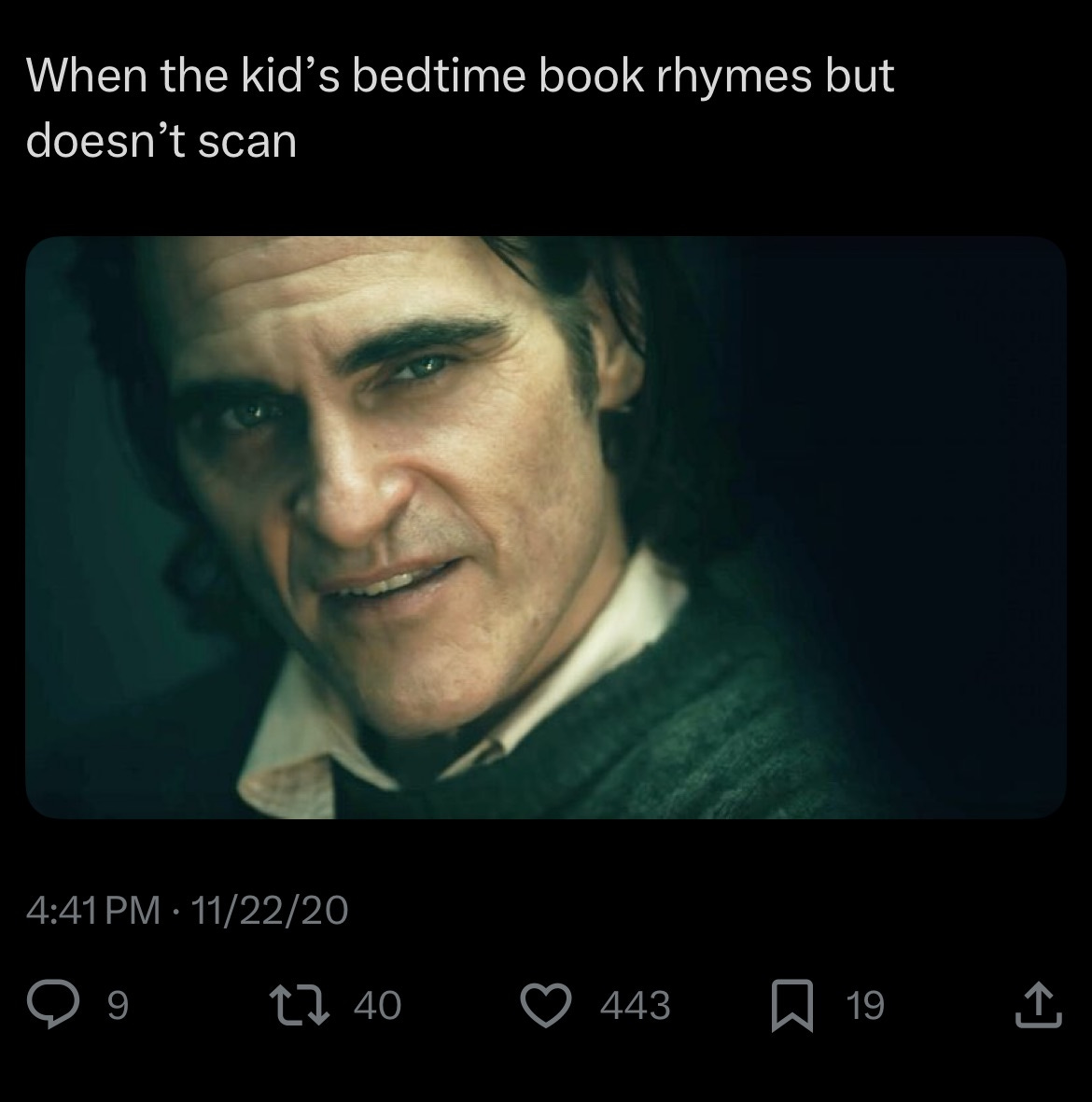
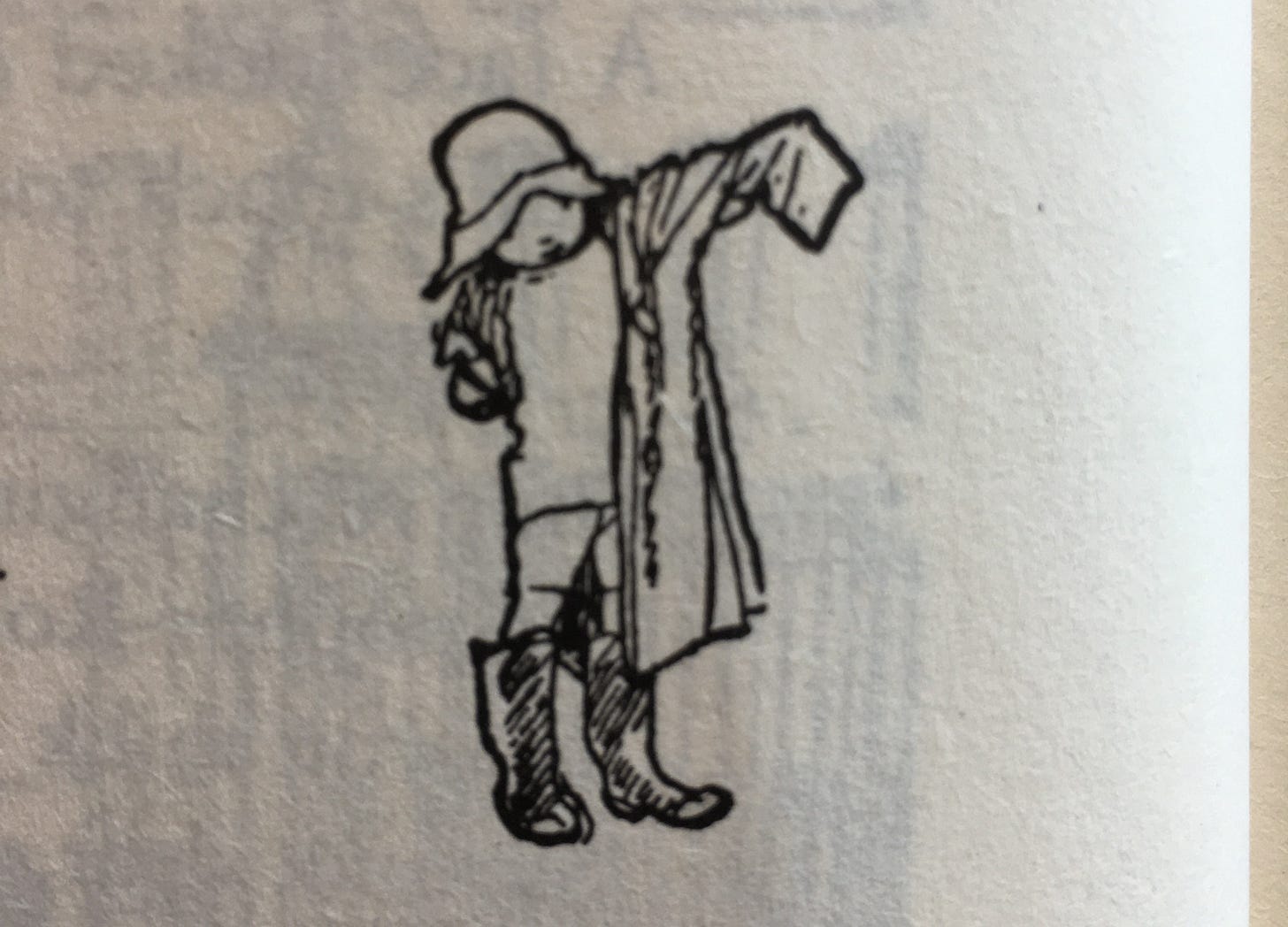

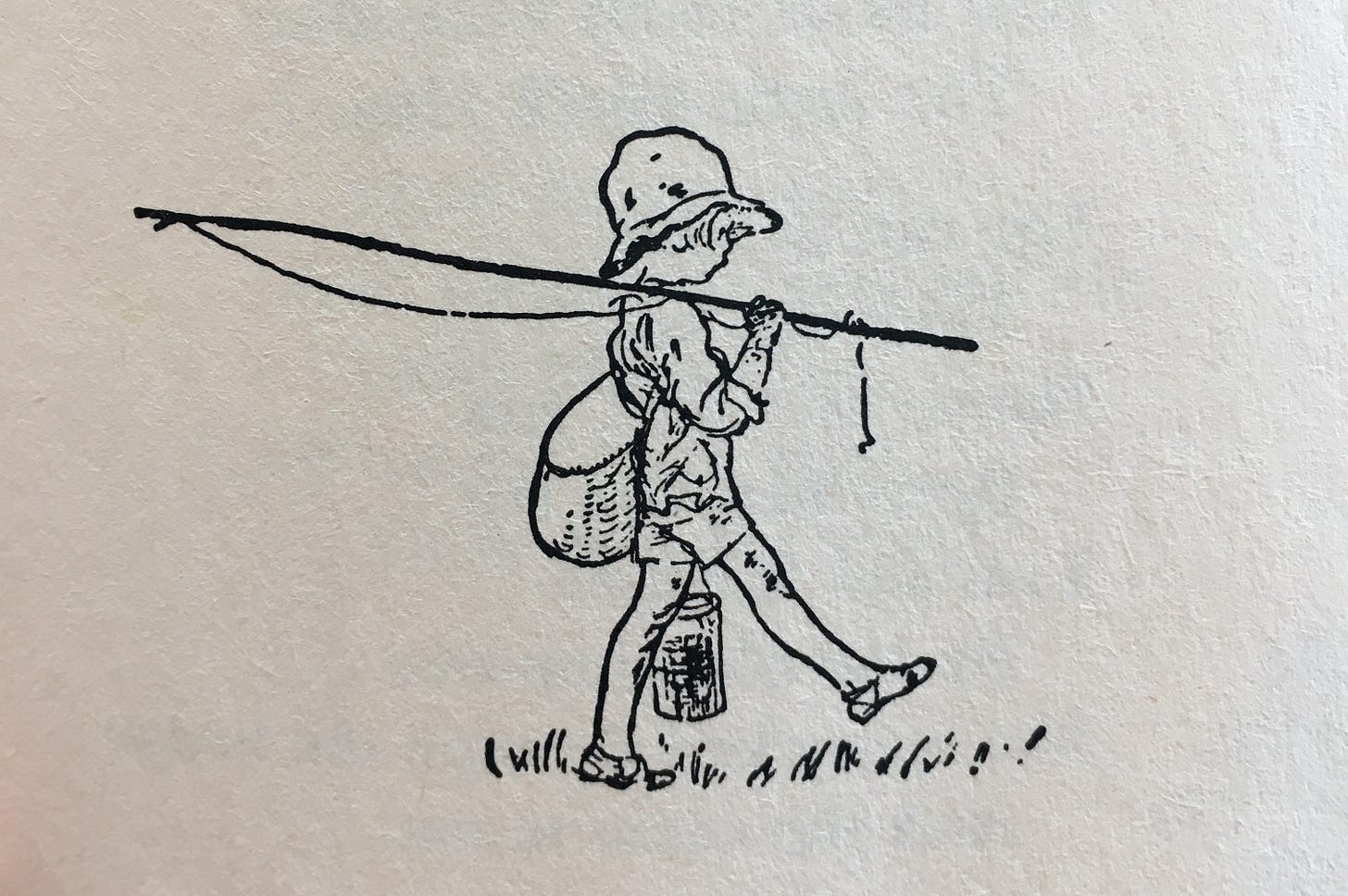
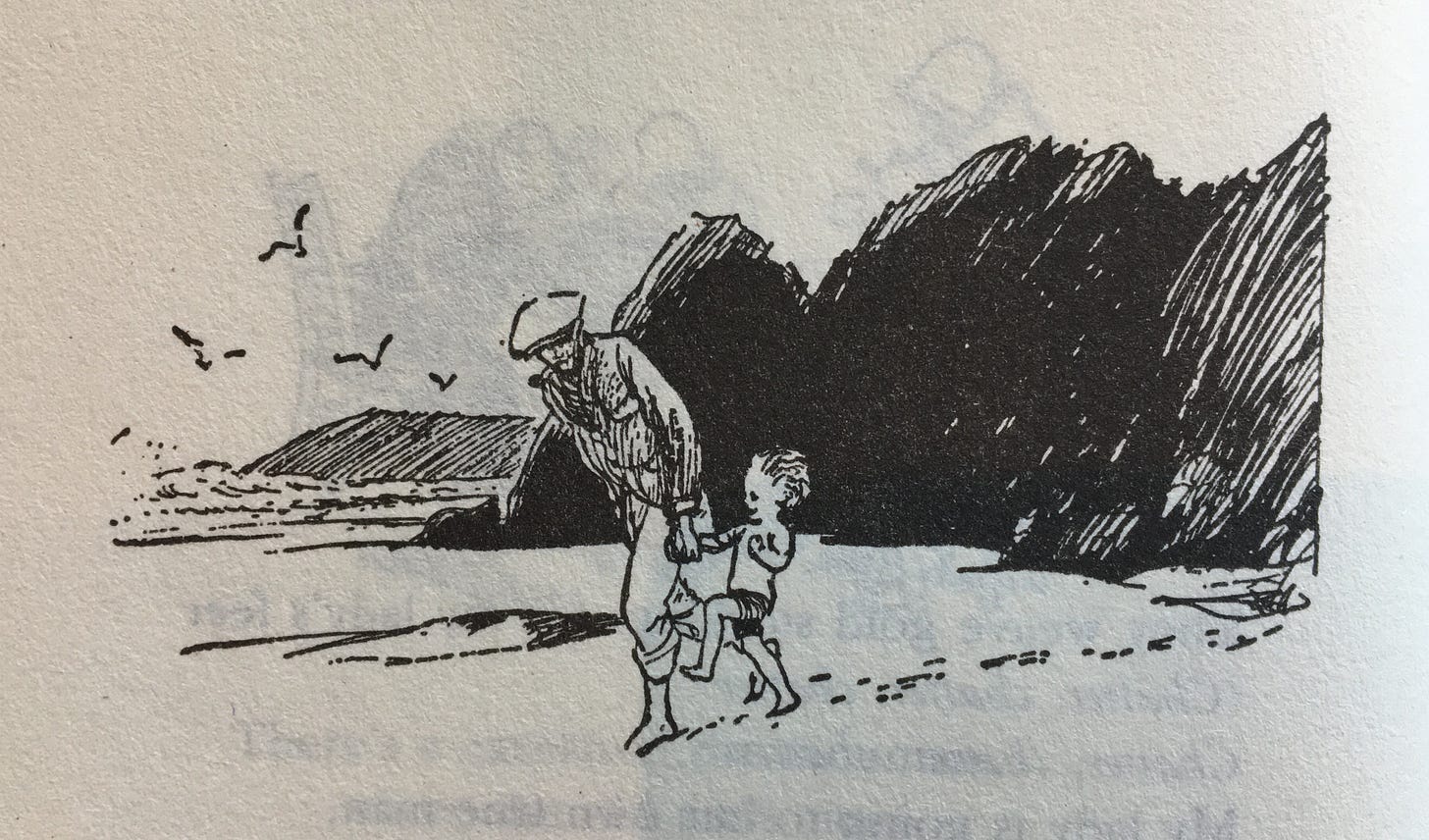
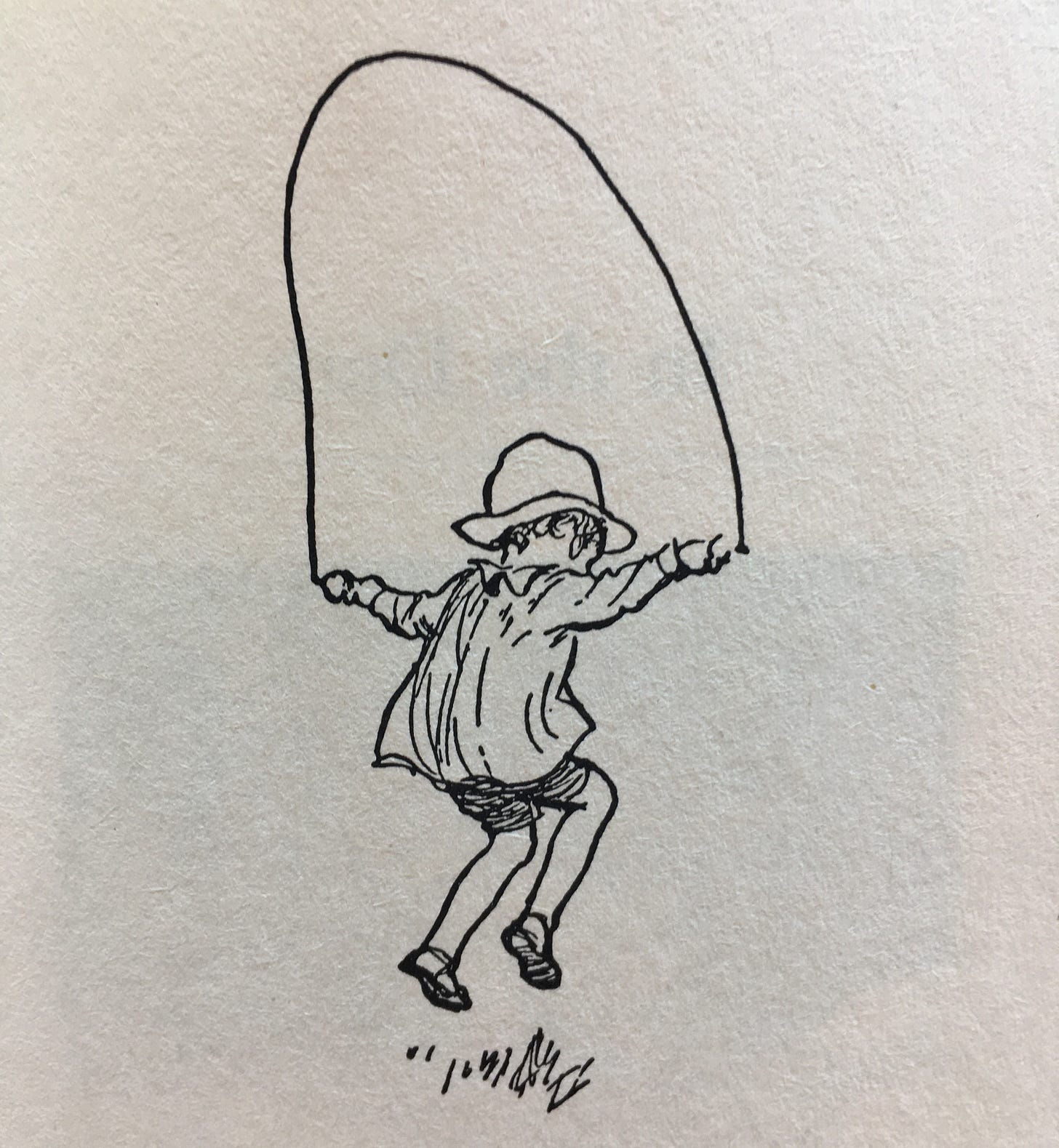
I know there are lots of adults who don’t like Ramona Quimby (“she’s a brat” etc.) but when I was a kid I remember reading those books and positively wondering how an adult could have written them. How could an adult remember what it was like to feel so frustrated with the world that was beyond the control of a child to change? I remember, very clearly, thinking that Beverly Cleary was proof that not all adults were like the ones in my life (whom I was so frustrated with at the time!), and some adults *must* remember how hard it is to be a kid.
I’m not claiming the Ramona books as high literature, but I think Cleary really does get a certain kind of kid in a certain phase of childhood.
I love this, Ellen.